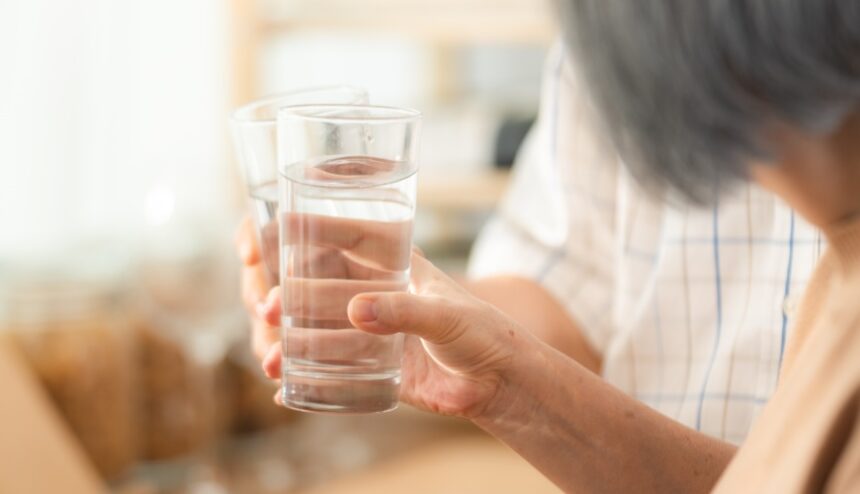Older Adults are More at Risk
 By Nathan Tiedeman, DNP, Emergency Department
By Nathan Tiedeman, DNP, Emergency Department
Now that it’s officially colder outside – your risk for dehydration is more than you might expect. Most people don’t notice the fluids leaving their bodies during the winter months, whether they exercise or not, and severe dehydration can happen. When you don’t feel thirsty or crave water like in the warm summer months, you don’t get the fluids your body needs to replenish what was lost. Also, did you know that every time you “see your breath” when it’s cold outside, it’s water leaving your body and evaporating? The drier the air, the more water you lose this way.
Mild dehydration symptoms can range from simple annoyances to daily frustrations, including:
- Headaches
- Mild fatigue
- Dry skin and lips
- Loss of concentration and ability to focus
Severe Dehydration
Severe dehydration can happen quickly because our busy lifestyles easily overlook the pesky mild dehydration symptoms. The lack of water can result in kidney stones, urinary tract infections, and constipation. To avoid a trip to the ER or admission to the hospital for IV fluids, avoid these severe dehydration symptoms:
- Confusion or disorientation
- Dizziness
- Feeling unusually tired
- Rapid breathing and a racing heart
- Muscle cramps
- Severe headache
- Nausea and vomiting
- Not passing urine
Rehydration
The time it takes for your body to rehydrate depends on how dehydrated you are. Start with drinking 20 ounces of water, and mild dehydration symptoms may subside within an hour. You can opt for a sports drink containing electrolytes.
Tips for Drinking More Water:
- Get a water bottle you love to help you sip on water throughout the day, every day.
- Make it a habit to drink a glass of water first thing in the morning, with every meal, before you go to bed, etc.
- Swap your caffeinated drinks for decaf, even your coffee. Try half-caff for a week or two to help you slowly detox from the caffeine.
- It can help to chug a glass of water if sipping doesn’t cut it.
- Enlist a friend and have daily water-drinking contests. It may help with the boredom of drinking water.
- Add water-rich fruits and vegetables such as leafy greens, citrus fruits, melon, tomatoes, cucumbers, bell peppers, broccoli, and celery.
How much water should I drink daily?
Most healthy people are encouraged to drink half their body weight in water. So, if a person weighs 150 pounds, they should aim to drink 75 ounces of water every day. It is a simple rule of thumb and an obtainable goal to achieve.
All the recommendations that show the importance of daily hydration do not consider the presence of an acute illness. I want you to imagine a viral illness, such as influenza or COVID, as your immune system is overactive. You may be relaxed on the couch, but your immune system is running a marathon. Just like a marathon runner needs hydration and nutrition to ensure they can finish the marathon appropriately, with illnesses such as influenza and COVID, you may not feel the need to drink or eat. Still, your immune system needs more nourishment to finish the marathon strong and healthy.
Urine Gauge
Your urine color will be your best hydration level indicator. Charts are available online or ask your doctor for guidance. Drink a tall glass of water when urine becomes darker than light yellow.
Why is hydration (water) such a big deal?
Water serves a number or essential functions to keep us all going. The brain and heart are composed of 73% water, the lungs are about 83% water. The skin contains 64% water, muscles and kidneys 79%, and even the bones are watery at 31%. In adult men, about 60% of their bodies are water. However, fat tissue does not have as much water as lean tissue. In adult women, fat makes up more of the body than men, so about 55% of their bodies are made of water. In addition to this, below are the functions of water in our bodies:
- A vital nutrient to the life of every cell, water acts first as a building material
- A regulator of our internal body temperature, by sweating and respiration
- A metabolizer. The carbohydrates and proteins that our bodies use as food are metabolized and transported by water in the bloodstream.
- A shock absorber for the brain, spinal cord, and fetus
- A saliva manufacturer
- A joint lubricator
For your overall health and wellness, it is worth the effort it takes to drink more water than you’re used to – every day.

